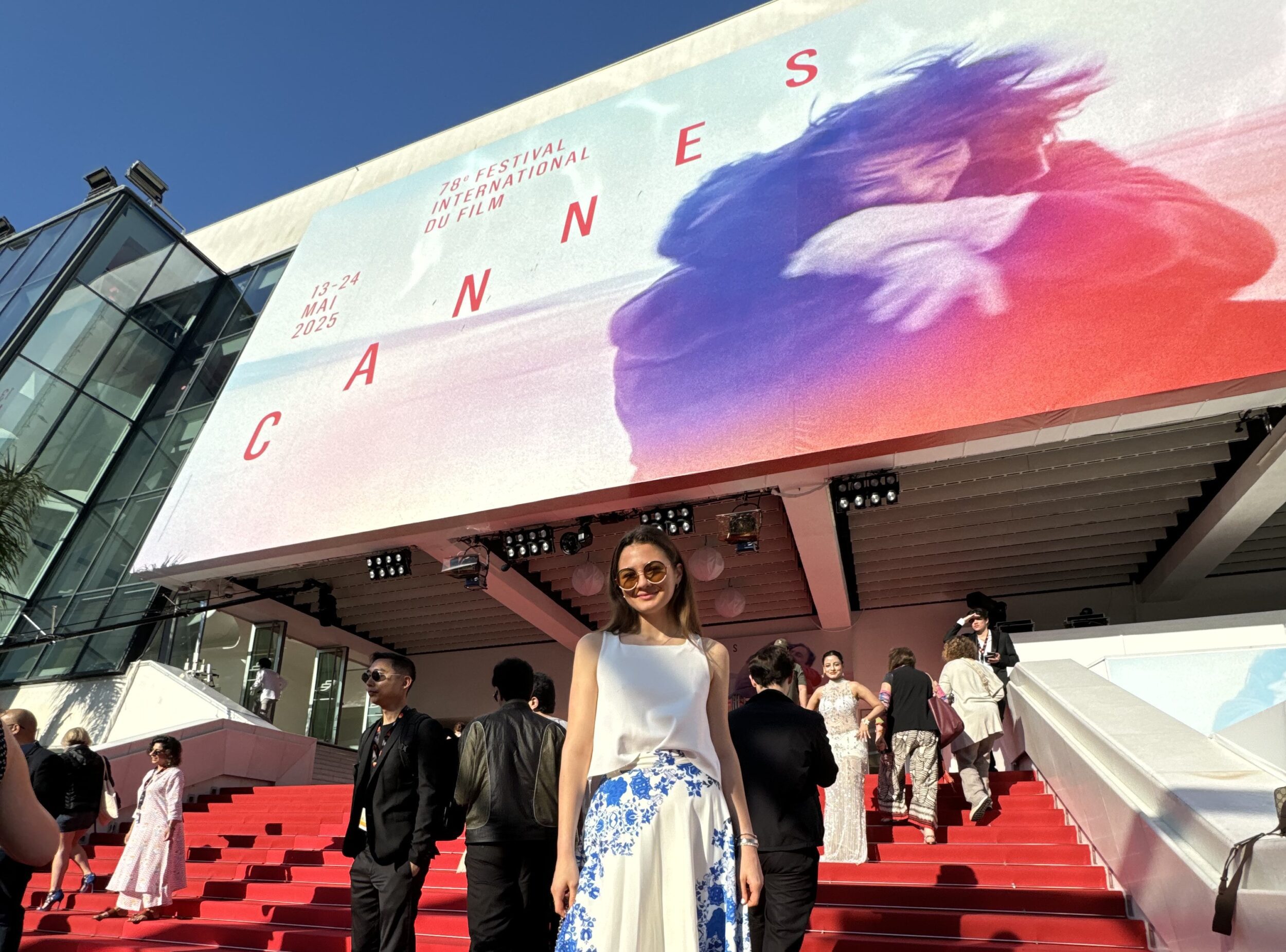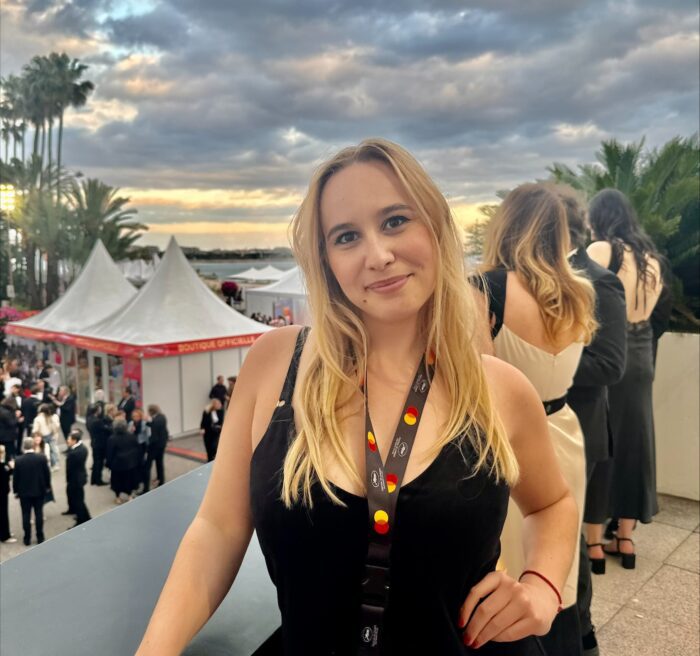Students of SZFE at the Cannes Film Festival
2025 June 11., Wednesday 12:33.
The Cannes Film Festival is the world’s most famous and prestigious film festival, held every year in the second half of May in Cannes. The main venue for the screening of films competing for the Palme d’Or, the festival’s top prize, is the Festival and Congress Palace (Palais des Festivals et des Congrès) on the Croisette. This year, 25 students from the SZFE traveled to the festival; we spoke with two of them, first-year television production student Kata Hegedüs and second-year student Eszter Simon, about their experiences.
How did you get to the Cannes Film Festival?
Kata Hegedüs: Since the SZFE, as a film arts university, was able to secure accreditation for its students this year, everyone arranged their own accommodation and flights. Personally, I can say that this opportunity is worth every penny and is a must for anyone involved in the film industry. The Cannes Film Festival is an experience that really opens your eyes to how big and multifaceted this art form really is, while also providing insight into the business fundamentals of film distribution. During the festival, you can visit the Village International, where 90 countries are represented with stands, and the Marché du Film, where all film professionals try to sell or buy their next project. In addition to the film screenings, the festival also places great emphasis on promoting networking.
Eszter Simon: I am now in my second year and I was not in Cannes last year. After doing some research on the event, I came to the conclusion that this would be a huge opportunity. Especially since I will be graduating next year, so I’m not sure if I’ll be able to spend a week traveling at this time next year. So I decided that if ever there was a time to seize this opportunity, it was now. It’s important to note that accreditation alone does not mean that we can rub shoulders with world stars or that we will have access to everything, but it does provide a great opportunity to create these interactions for ourselves.

Were there any problems during the six days?
K.H.: It started off funny, because when we arrived, our host didn’t answer the phone or respond to the doorbell, so we waited in front of the house for about half an hour to find out if we would have a place to stay. As it turned out later, the person had fallen asleep around 10 p.m. – but we finally got in. That was perhaps the only initial hiccup, but otherwise I can’t really report any problems. Even that situation was more funny than unpleasant.
How can you get into the film screenings?
K.H.: Actually, sometimes we were “just” lucky. Having your accreditation and entry card does not automatically entitle you to get into the films. The website opens at 8 a.m. for each screening, and you have to hunt for tickets there—or constantly refresh the page. One of our greatest successes was getting tickets at 1 a.m. for the screening of Mission Impossible at 8:30 a.m. the next morning. Of that Mission Impossible that was screened twice in Cannes. However, there were also times when we lined up for last-minute tickets before the screening. That’s how we got into Richard Linklater’s film La Nouvelle Vague, which takes place on the set of Jean-Luc Godard’s legendary film À bout de souffle in Paris in 1959. It was an indescribable experience to watch the film with the crew, which was both a historical reconstruction and a tribute to the birth of auteur cinema.
What were the most memorable experiences?
K.H.: You have to know that my family are huge Mission Impossible fans. Huge. I generally love art films, but I also love mainstream films, and what Tom Cruise does in that film, in the whole franchise, is absolutely amazing. Being able to watch the finale of this at the Cannes Film Festival was an unforgettable experience for me. The other highlight was Quentin Tarantino: I saw him live and heard him speak—he was literally an arm’s length away from me. It was amazing to meet names like Jennifer Lawrence, Pedro Pascal, Emma Stone, Austin Butler, Robert Pattinson, and Quentin Tarantino every day, because this is the festival where everyone shows up.
E.S.: I really wanted to attend a black tie screening where the audience could watch the film together with the stars and creators. Last-minute tickets are available for such screenings, but in this case, if, for example, a screening starts at 7 p.m. and tickets are no longer available, people go there at 10 a.m. in evening dress and stand there all day in uncertainty: either there will be tickets or there won’t. Fortunately, we still managed to get into one of these screenings.
K.H.: As a Hungarian, one of the highlights of the festival for me was, of course, István Szabó’s lifetime achievement award, as well as the fact that we were able to watch Sunshine in its restored form by the National Film Archive in a festival setting. It was very inspiring to see 87-year-old István Szabó begin his speech in French and then switch to English without hesitation. We were in an incredibly motivating environment throughout those six days. The fact that everyone is a filmmaker, everyone is involved in motion pictures and is part of this industry in some way, really reinforces the idea that this is what you should be doing. It is a privilege to be able to do this.
E.S.: Absolutely, and what I feel overall about this trip is gratitude. Gratitude for having had this opportunity, gratitude for the lessons learned, and gratitude for the certainty that this is what I want to do in the future. Cannes showed me the way to become part of it all.

What lessons did you bring home with you?
E.S.: For me, the most remarkable thing about those six days was that my English communication skills improved more than they had in the previous ten years. Cannes forced me to speak, to say what I thought, and to connect with people. It was only six days, which isn’t that long, but it was very intense.
K.H.: As a Hungarian student attending the University of Theatre and Film Arts, this experience shed light on the entire profession, showing us that it is indeed necessary to promote films and apply for competitions, because it is a constant race. We saw out there that it’s never enough; you always have to take it one step further and do better. I think this pursuit of peak performance is truly exemplary abroad. You have to keep your eyes open in the world and travel, gain experience—not just at home. We can consider ourselves lucky every day that we can do this, and it is indeed necessary to devote time to seeing how foreign professionals work.
Other News
The First Half-Century of the Théâtre du Soleil and Two Special Guests – Book Launch in the SZFE Books Series
The SZFE Books series is once again enriched with a significant volume. Its mission is to make essential theatrical and film works available in Hungarian, works that are indispensable to contemporary artistic discourse. The newest addition is French theatre historian Béatrice Picon-Vallin’s book: Théâtre du Soleil – The First Half-Century of Ariane Mnouchkine’s Sun Theatre. The launch will take place on September 29 at the Doctoral School of SZFE.
“The Body Is Reality” – David Cronenberg in Budapest
David Cronenberg, the world-renowned Canadian director of the body-horror genre, visited the Uránia National Film Theatre as the guest of honor of the Budapest Classic Film Marathon. At the audience Q&A organized by the NFI and SZFE, viewers heard not only about the beginnings of his career and behind-the-scenes stories from his legendary films, but also about what technology and artificial intelligence mean to him.
Romeo and Juliet in the Rain – the Sopron International Theatre Workshop has concluded
In 2025, the University of Sopron once again hosted the International Theatre Workshop. On the closing day, July 8, the students presented the short stage performances inspired by Shakespeare’s Romeo and Juliet that they had been working on during the week at six different locations in the university’s botanical garden.
International Theatre Workshop Launched in Sopron - Young Artists from Six Countries Collaborate in a Weeklong Creative Residency
The University of Theatre and Film Arts Budapest (SZFE), in collaboration with the National Theatre of Hungary and the University of Sopron, proudly presents the second edition of the International Theatre Workshop – Sopron 2025, taking place from 1 to 9 July on the picturesque campus of the University of Sopron. The initiative gathers jung actors and directors from Hungary and abroad, alongside distinguished educators and theatre professionals, for a week of intensive artistic collaboration. The official opening ceremony was held on 2 July at the Ligneum Event House.
The stage awaits! – new masterclasses at the SZFE
The University of Theatre and Film Arts will launch three 12-week masterclasses in February 2025: movement, voice training and a combined movement-voice training masterclass. The training coordinator for the movement masterclass is Vidáné Szent-Ivány Kinga, associate professor and winner of the Gyula Harangozó Prize, while the voice training coordinator is Borbála Keszei, assistant professor and winner of the Liszt Ferenc Prize.
Budapest among the best student cities in Europe
Based on a survey by The Campus Advisor, Daily News Hungary published the European university ranking, in which Budapest ranked 4th. The analysis is based over 17,000 authentic ratings by students and reflecting the real experiences of those with first hand knowledge.
Unique concepts - King Lear as a film or a stage play unique concepts
On a fortuitous day, December 13th, all eight of our Erasmus students presented their examination projects from their product design course under the guidance of Professor Éva Szendrényi. The focal point of their project work was the adaptation of the first scene of King Lear, either as a film or a stage play, applying the students’ unique concepts. The adaptations ranged from contemporary themes – a drag queen show, a modern USA Wall Street business narrative – to a fantasy tale. The presentations combined freehand drawings and photos. It was fascinating to observe how the students conveyed the characters’ features and dynamics through costumes, exploring how textures and colours could represent the nuances of the characters’ roles and the social distances within the narrative. Each presentation showed how the space, costumes, colours, and lighting design work in a play or film, expressing our students’ creativity and skills.
Money-making has always been a part of Art
Prof. Paulo Leite teaches at Instituto Politécnico de Lisboa in Portugal – He specialises in screenwriting and production and has long been involved in screenwriting and film finance and film marketing in the UK. We asked him about his experiences and views during his Erasmus exchange at SZFE.
